I want to backup my whole Laravel application mysql database from my application by clicking a button, anyone to help?
7 Answers
(Laravel Backup) by Spatie.
this package provides you with a command (php artisan backup:run
). which is not exactly what you need.
But you can create a button in your admin section with a link to a route. and from there (either from the route or controller) you can call this command by
Artisan::call('backup:run');
which will trigger a backup.
- 10,374
- 6
- 46
- 82
-
It gave me an error saying "The command "backup:run" does not exist." – Feroz Khan Apr 08 '21 at 06:15
-
The dump process failed with exitcode 2 : Misuse of shell builtins : mysqldump: Got error: 2004: "Can't create TCP/IP socket (10106)" when trying to connect – codelone Sep 30 '22 at 08:25
read this artical https://stackoverflow.com/a/65890498/14913109
return response()->download($latest_filename);// read above artical
- 172
- 2
- 20
create command
app/Console/Commands/DatabaseBackUp.php
<?php
namespace App\Console\Commands;
use Illuminate\Console\Command;
use Carbon\Carbon;
class DatabaseBackUp extends Command
{
/**
* The name and signature of the console command.
*
* @var string
*/
protected $signature = 'database:backup';
/**
* The console command description.
*
* @var string
*/
protected $description = 'Command description';
/**
* Create a new command instance.
*
* @return void
*/
public function __construct()
{
parent::__construct();
}
/**
* Execute the console command.
*
* @return int
*/
public function handle()
{
$filename = "backup-" . Carbon::now()->format('Y-m-d') . ".gz";
$command = "mysqldump --user=" . env('DB_USERNAME') ." --password=" . env('DB_PASSWORD') . " --host=" . env('DB_HOST') . " " . env('DB_DATABASE') . " | gzip > " . storage_path() . "/app/backup/" . $filename;
$returnVar = NULL;
$output = NULL;
exec($command, $output, $returnVar);
}
}
and in app/Console/Kernel.php
update
protected $commands = [
'App\Console\Commands\DatabaseBackUp'
];
and run php artisan database:backup command
- 67
- 5
//make this code in custom command
namespace App\Console\Commands;
use Illuminate\Console\Command;
use Carbon\Carbon;
class DatabaseBackUp extends Command
{
/**
* The name and signature of the console command.
*
* @var string
*/
protected $signature = 'database:backup';
/**
* The console command description.
*
* @var string
*/
protected $description = 'Command description';
/**
* Create a new command instance.
*
* @return void
*/
public function __construct()
{
parent::__construct();
}
/**
* Execute the console command.
*
* @return int
*/
public function handle()
{
$filename = "backup-" . Carbon::now()->format('Y-m-d') . ".sql";
$command = "mysqldump --user=" . env('DB_USERNAME') ." --password=" . env('DB_PASSWORD') . " --host=" . env('DB_HOST') . " " . env('DB_DATABASE') . " | gzip > " . storage_path() . "/app/backup/" . $filename;
$returnVar = NULL;
$output = NULL;
exec($command, $output, $returnVar);
}
}//aadd thi in app/kernal.php
'Illuminate\Foundation\Http\Middleware\CheckForMaintenanceMode',
'Illuminate\Cookie\Middleware\EncryptCookies',
'Illuminate\Cookie\Middleware\AddQueuedCookiesToResponse',
'Illuminate\Session\Middleware\StartSession',
'Illuminate\View\Middleware\ShareErrorsFromSession',
'App\Http\Middleware\SessionExpired'
protected $middlewareGroups = [
'web' => [
\App\Http\Middleware\EncryptCookies::class,
\Illuminate\Cookie\Middleware\AddQueuedCookiesToResponse::class,
\Illuminate\Session\Middleware\StartSession::class,
\Illuminate\View\Middleware\ShareErrorsFromSession::class,
\App\Http\Middleware\VerifyCsrfToken::class,
\Illuminate\Routing\Middleware\SubstituteBindings::class,
\App\Http\Middleware\SessionExpired::class,
],- 1
- 1
-
Your answer could be improved with additional supporting information. Please [edit] to add further details, such as citations or documentation, so that others can confirm that your answer is correct. You can find more information on how to write good answers [in the help center](/help/how-to-answer). – Community Jun 24 '22 at 12:19
Another approach for it, which I'm using here Shell_exec make sure it's enabled in your xampp/wamp
Note: I'm using PHP 7.4.29 on localhost
Check if shell_exec is Enabled
if(function_exists('shell_exec')) {
echo "shell_exec is enabled";
}
shell_exec("C:/xampp/mysql/bin/mysqldump -h localhost -u root test > C:/xampp/htdocs/projects/main.sql");
syntax
Path to mysqldump -h [host] -u [username] -p[passowrd] [database-name] > [path/dump-name].sql
Note: remove -p if empty (no white space)
C:/xampp/htdocs/projects/main.sql Where you want to save sql file
Also check this reference for help: https://stackoverflow.com/a/15294585/13804634
Make sure your mysqldump set in your environment variables if
'mysqldump' is not recognized as an internal or external command
- 604
- 8
- 17
Export Only Table Data Backup without structure with row limit
Keynote:
- API
- Zip Download
- Only data backup not structure
- Order by 1 column
- No need mysql dump permission
- DB Data Export with row limit
- Exclude specific tables data to export
- In Route
Route::group(['prefix' => 'v1/db-migration', 'middleware'=>'auth:api'], function (){
Route::post('server-db-structure-backup', [DBController::class, 'serverDBStructureBackup']);
Route::post('server-db-data-backup', [DBController::class, 'serverDBDataBackup']);
Route::post('server-db-status', [DBController::class, 'serverDBStatus']);
});
- In Controller
public function serverDBDataBackup(Request $request) // db data backup only
{
$dir = $_SERVER['DOCUMENT_ROOT'].'/uploads/db/backups/';
File::ensureDirectoryExists($dir);
$file_name = 'db_backup_'.Str::slug(getNow(), '_').'.sql';
$file_full_url = $dir.$file_name;
$file = fopen($file_full_url, 'w');
$databaseName = DB::getDatabaseName();
$table_names = DB::table('information_schema.tables')
->where('table_schema', $databaseName)
->where('TABLE_TYPE', 'BASE TABLE')
// ->where('table_name', 'users') // later remove
->when($request->filled('except_tables') && count($request->except_tables), function ($q){
$q->whereNotIn('table_name', request('except_tables'));
})
->pluck('table_name')
->toArray();
// Loop through the tables and export data into files
foreach ($table_names as $table_name)
{
$data = DB::table($table_name) // getting a table dataset using select
->when($request->filled('table_rules') && count($request->table_rules), function ($q) use($request, $table_name) // executing all rules
{
foreach ($request->table_rules as $key => $rule)
{
if (isset($rule['table_name']) && $rule['table_name']==$table_name && isset($rule['row_limit'])) // for table row limit
{
$q->limit($rule['row_limit']);
}
if (isset($rule['table_name']) && $rule['table_name']==$table_name && isset($rule['order_by']) && isset($rule['order_type'])) // for table order by
{
$q->orderBy($rule['order_by'], $rule['order_type']);
}
}
})
->get();
if ($data->count() > 0)
{
fwrite($file, PHP_EOL.PHP_EOL.'-- ==================Table: '.$table_name.'================== '.PHP_EOL.PHP_EOL);
foreach ($data as $row)
{
$insert = "INSERT INTO `$table_name` (";
$values = "VALUES (";
foreach ($row as $column => $value)
{
$insert .= "`$column`, ";
$values .= "'" . addslashes($value) . "', ";
}
$insert = rtrim($insert, ', ') . ")";
$values = rtrim($values, ', ') . ");\n";
fwrite($file, $insert . " " . $values);
}
}
}
fclose($file); // close the file
$zip_file_full_url = substr($file_full_url, 0, -3).'zip'; // zip full url
$zip_file_name = substr($file_name, 0, -3).'zip'; // zip file name
$zip = new ZipArchive();
$zip->open($zip_file_full_url, ZipArchive::CREATE); // open the zip archive
$zip->addFile($file_full_url, $file_name); // add file to zip archive
$zip->close(); // close the file
File::delete($file_full_url); // after zip delete the sql file
return Response::download($zip_file_full_url, $zip_file_name, [ // download the zip file
'Content-Type' => 'application/zip',
]);
}
- In Postman request
//except_tables[0]:activity_log
except_tables[1]:audit_trail
table_rules[0][table_name]:users
table_rules[0][row_limit]:10
table_rules[1][table_name]:activity_log
table_rules[1][row_limit]:10
table_rules[1][order_by]:id
table_rules[1][order_type]:DESC
- 180
- 1
- 6
